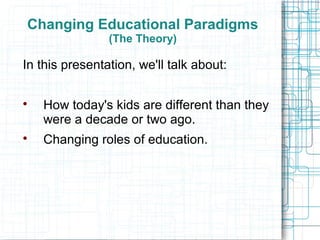Educational paradigms, part i
•Als PPT, PDF herunterladen•
0 gefällt mir•302 views
The document discusses how today's students have grown up with technology and short attention spans, thinking work and school should be entertaining. It argues that the current educational system, based on Enlightenment philosophies, is mismatched for the Information Age where students must learn to sort and think critically about vast amounts of information to become lifelong learners. It suggests educational reforms should integrate tools like games, simulations and social networking that are already used in workplaces.
Melden
Teilen
Melden
Teilen

Empfohlen
Empfohlen
Weitere ähnliche Inhalte
Was ist angesagt?
Was ist angesagt? (20)
Destination ImagiNation - Leapfrog Institutes Collaboration

Destination ImagiNation - Leapfrog Institutes Collaboration
#futurehappens - Challenging educational paradigms and the changing role of t...

#futurehappens - Challenging educational paradigms and the changing role of t...
Schooling for the 21st Century: Unleashing Student Passion

Schooling for the 21st Century: Unleashing Student Passion
Andere mochten auch
Andere mochten auch (16)
Health%252 b care%252breform%252bproject%252bpart%252bii-1-1 (3)

Health%252 b care%252breform%252bproject%252bpart%252bii-1-1 (3)
Ähnlich wie Educational paradigms, part i
Ähnlich wie Educational paradigms, part i (20)
Web 2.0: Balancing the Protection of Students and Learning

Web 2.0: Balancing the Protection of Students and Learning
Educational paradigms, part i
- 1. Changing Educational Paradigms (The Theory) In this presentation, we'll talk about: How today's kids are different than they were a decade or two ago. Changing roles of education.
- 2. But first... Here are some important things to keep in mind: Today's generation has grown up with technology. It's not bad, it's not wrong, it's different.
- 3. How Are Kids Different? They are constantly surrounded by media.
- 4. How Are Kids Different? Their attention spans are shorter.
- 5. How Are Kids Different? They think things like work and school should be entertaining by nature.
- 6. How Are Kids Different? Part of their “self” is now contained online.
- 7. How Are Kids Different? “Our newest generation – currently in K-12 – is demonstrating for us the impact of having developed under the digital wave. These youth have been completely normalized by digital technologies—it is a fully integrated aspect of their lives. Many students in this group are using new media and technologies to create new things in new ways, learn new things in new ways, and communicate in new ways with new people—behaviors that have become hardwired in their ways of thinking and operating in the world. Children are establishing a relationship to knowledge gathering which is alien to their parents and teachers.”
- 8. So, What's the Problem? We are using Enlightenment era philosophies of education in the Age of Information.
- 9. So, What's the Problem? The Enlightenment was a revolution in education... ...but this is how they viewed education:
- 10. So, What's the Problem? But we're living in the Information Age... ...and there's a LOT more information to deal with: bucket
- 11. Therefore... Our educational system should: − Help students SORT information. − Help students THINK CRITICALLY. − Create LIFE-LONG LEARNERS. − Not force students to memorize USELESS KNOWLEDGE.
- 12. Things to Think About: “Games, simulations, and social networking are already permeating the workplace as productivity and development tools – we may be doing our students a large disservice by not integrating these tools into their education.” Don't use technology for technology's sake.